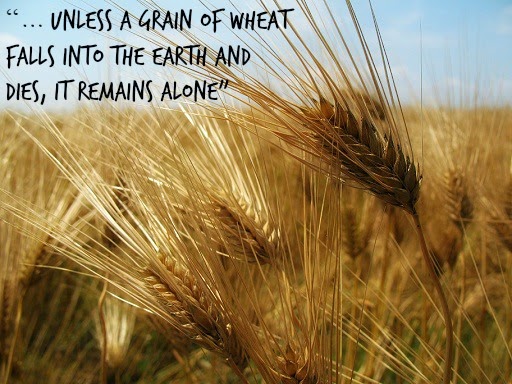FOUNDER’S QUOTE
August 10, 2017From Coast to Coast, America is Throwing an Eclipse Party
August 10, 2017
“If it dies, it bears much fruit”
24 Truly, truly, I say to you, unless a grain of wheat falls into the earth and dies, it remains alone; but if it dies, it bears much fruit. 25 He who loves his life loses it, and he who hates his life in this world will keep it for eternal life. 26 If any one serves me, he must follow me; and where I am, there shall my servant be also; if any one serves me, the Father will honor him.
Meditation: What can a grain of wheat tell us about life and the kingdom of God? Jesus drew his parables from the common everyday circumstances of life. His audience, mostly rural folk in Palestine, could easily understand the principle of new life produced by dead seeds sown into the earth. What is the spiritual analogy which Jesus alludes to? Is this, perhaps, a veiled reference to his own impending death on the cross and his resurrection on the third day? Or does he have another kind of “death and rebirth” in mind for his disciples? Jesus, no doubt, had both meanings in mind for his disciples.
The image of the grain of wheat dying in the earth in order to grow and bear a harvest can be seen as a metaphor of Jesus’ own death and burial in the tomb and his resurrection. Jesus knew that the only way to victory over the power of sin and death was through the cross. Jesus reversed the curse of our first parents’ [Adam and Eve] disobedience through his obedience to the Father’s will – his willingness to go to the cross to pay the just penalty for our sins and to defeat death once and for all. His obedience and death on the cross obtain for us freedom and new life in the Holy Spirit. His cross frees us from the tyranny of sin and death and shows us the way of perfect love. There is a great paradox here. Death leads to life. When we “die” to our selves, we “rise” to new life in Jesus Christ.
What does it mean to “die” to oneself? It certainly means that what is contrary to God’s will must be “crucified” or “put to death”. God gives us grace to say “yes” to his will and to reject whatever is contrary to his loving plan for our lives. Jesus also promises that we will bear much “fruit” for him, if we choose to deny ourselves for his sake. Jesus used forceful language to describe the kind of self-denial he had in mind for his disciples.
What did he mean when he said that one must hate himself? The expression to hate something often meant to prefer less. Jesus says that nothing should get in the way of our preferring him and the will of our Father in heaven. Our hope is in Paul’s reminder that “What is sown in the earth is subject to decay, what rises is incorruptible” (1 Corinthians 15:42). Do you hope in the Lord and follow joyfully the path he has chosen for you?
“Lord Jesus, let me be wheat sown in the earth, to be harvested for you. I want to follow wherever you lead me. Give me fresh hope and joy in serving you all the days of my life.”
Psalm 112:1-2,5-9
1 Praise the LORD. Blessed is the man who fears the LORD, who greatly delights in his commandments!
2 His descendants will be mighty in the land; the generation of the upright will be blessed.
5 It is well with the man who deals generously and lends, who conducts his affairs with justice.
6 For the righteous will never be moved; he will be remembered for ever.
7 He is not afraid of evil tidings; his heart is firm, trusting in the LORD.
8 His heart is steady, he will not be afraid, until he sees his desire on his adversaries.
9 He has distributed freely, he has given to the poor; his righteousness endures for ever; his horn is exalted in honor.
Daily Quote from the early church fathers: The seed must die before being resurrected, by Irenaeus, 135-202 A.D.
“A cutting from the vine planted in the ground bears fruit in its season, or a kernel of wheat falling into the earth and becoming decomposed rises and is multiplied by the Spirit of God, who contains all things. And then, through the wisdom of God, it serves for our use when, after receiving the Word of God, it becomes the Eucharist, which is the body and blood of Christ. In the same way our bodies, being nourished by it, and deposited in the earth and suffering decomposition there, shall rise at their appointed time. The Word of God grants them resurrection to the glory of God, even the Father who freely gives to this mortal immortality, and to this corruptible incorruption (1 Corinthians 15:53). This is so because the strength of God is made perfect in weakness (1 Corinthians 15:43; 2 Corinthians 13:4) in order that we may never become puffed up, as if we had life from ourselves, or become exalted against God with ungrateful minds.” (excerpt from AGAINST HERESIES 5.2.3)
Meditations may be freely reprinted for non-commercial use – please cite: copyright (c) 2017 Servants of the Word, source: www.dailyscripture.net, Author Don Schwager
Scripture quotations from Common Bible: Revised Standard Version of the Bible, copyright 1973, and Ignatius Edition of the Revised Standard Version of the Bible, copyright 2006, by the Division of Christian Education of the National Council of the Churches of Christ in the United States of America. Used by permission. All rights reserved. Citation references for quotes from the writings of the early church fathers can be found here.




